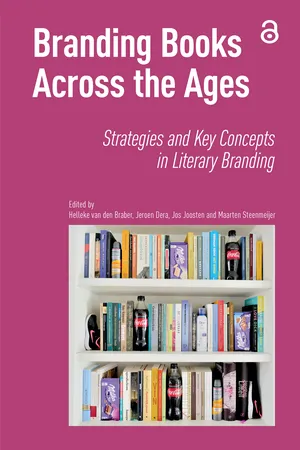
Branding Books Across the Ages
Strategies and Key Concepts in Literary Branding
- English
- ePUB (mobile friendly)
- Available on iOS & Android
Branding Books Across the Ages
Strategies and Key Concepts in Literary Branding
About this book
For many, literature and marketing are considered opposite phenomena. This book discusses cases in which the two are closely connected. It argues that literature is subject to the same mechanisms as other commercial products: our experience of literary texts is prefigured by brands, trademarks that identify a product and differentiate it from its competitors. From the early modern period onwards, literary authors and their texts are constantly 'branded' and have been both the object and the trailblazer of a complex marketing process. The authors of this volume analyze this branding process throughout the centuries, focusing on the Netherlands. To what extent is our experience of Dutch literature prefigured by brands, and what role does branding play when introducing European authors in the Dutch literary field (or vice versa)? By answering these questions, Branding Books Across the Ages seeks to show how literary scholars understand branding – a phenomenon that has long been intertwined with literature.|Introduction. Branding Books Across the Ages: Strategies and Key Concepts in Literary Branding (Jeroen Dera, Helleke van den Braber, Jos Joosten, and Maarten Steenmeijer), Cultural Branding in the Early Modern Period: The Literary Author (Lieke van Deinsen & Nina Geerdink),Telling a Double Story: The Branding of a Cultural Magazine 1904-1919 (Helleke van den Braber),A Hero and His History: The Branding of Jan III Sobieski and His Letters in the Northern Netherlands during The Early Nineteenth Century (Paul Hulsenboom),From Immorality to Immortality: Branding Madame Bovary in the Netherlands (Maaike Koffeman),Allegories of Branding: How to Successfully Fail Charles Bukowski (Gaston Franssen),Branding or Excluding? The Tenability of the 'Branding' Concept in the History of Nineteenth-Century Dutch Book Publishing, Book Printing, and Bookselling (Rob van de Schoor),Hugo Claus: 'I'm not Searching for Myself, but for the Media. I Don't Know Who I Am, I'm not Interested' (Gwennie Debergh),One Book's Brand is Another Book's Frame: Covering the Dutch Cover of Carlos Ruiz Zafón's La sombra del viento (Maarten Steenmeijer), 'The Most Successful Writer of the Netherlands': On the Success Myth of Dutch Bestseller Author Herman Koch (Sander Bax),Young Adults as Branded Readers (Linda Ackermans),Of Dust and Dollars: Branding Poetry in the 21st Century. The Case of Ellen Deckwitz (Jeroen Dera), 'This Is What We Share': Co-Branding Dutch Literature at the 2016 Frankfurt Book Fair (Jack McMartin),The One Unforgivable Transgression? Branding 'Kluun' as a Literary Strategy (Jos Joosten),Branding the Open-Minded Nation: Dutch Authors at the 2011 Beijing Book Fair (Laurens Ham),Against the Grain: The Das Mag Brand and Lize Spit's The Melting (2016) (Roel Smeets),Afterword. In Search of the Most Effective Way of Branding: The Label 'Literature' as a Means to an End (Bertram Mourits), Bibliography, Index.|- Focus on the dynamic process of branding - Focus on interactions between writers, publishers, critics, and readers - Wide historical scope|Branding books across the ages is een uiterst gevarieerde, naar zijn aard heterogene, maar bijna steeds onderhoudende en dikwijls grondige analyse van literaire casuïstiek. Of het nu gaat om het geploeter van Albert Verwey met de exploitatie van zijn tijdschrift De Beweging of om de opeenvolgende vertaalde Nederlandse edities, afwisselend als high en low culture, van Gustave Flauberts Madame Bovary, om het woeste schrijversimago van Charles Bukowski of om de brutale prstunts die Hugo Claus uithaalde bij gelegenheid van zijn schrijversdebuut, steeds draait het om de vraag welke middelen op welke manier en met welk effect door wie werden ingezet om erkenning en vooral succes te bereiken.- Maarten Asscher, Boekman 129 (2021)
Frequently asked questions
- Essential is ideal for learners and professionals who enjoy exploring a wide range of subjects. Access the Essential Library with 800,000+ trusted titles and best-sellers across business, personal growth, and the humanities. Includes unlimited reading time and Standard Read Aloud voice.
- Complete: Perfect for advanced learners and researchers needing full, unrestricted access. Unlock 1.4M+ books across hundreds of subjects, including academic and specialized titles. The Complete Plan also includes advanced features like Premium Read Aloud and Research Assistant.
Please note we cannot support devices running on iOS 13 and Android 7 or earlier. Learn more about using the app.
Information
Table of contents
- Cover
- Half Title
- Title Page
- Copyright Page
- Table of Contents
- Introduction
- Cultural Branding in the Early Modern Period: The Literary Author
- Telling a Double Story: The Branding of a Cultural Magazine, 1904-1919
- A Hero and His History: The Branding of Jan III Sobieski and His Letters in the Northern Netherlands during the Early Nineteenth Century
- From Immorality to Immortality: Branding Madame Bovary in the Netherlands
- Allegories of Branding: How to Successfully Fail Charles Bukowski
- Branding or Excluding?: The Tenability of the ‘Branding’ Concept in the History of Nineteenth-Century Dutch Book Publishing, Book Printing, and Bookselling
- Hugo Claus: ‘I’m Not Searching for Myself, but for the Media. I Don’t Know Who I Am, I’m Not Interested.’
- One Book’s Brand is Another Book’s Frame: Covering the Dutch Cover of Carlos Ruiz Zafón’s La sombra del viento
- ‘The Most Successful Writer of the Netherlands’: On the Success Myth of Dutch Bestselling Author Herman Koch
- Young Adults as Branded Readers
- Of Dust and Dollars: Branding Poetry in the Twenty-first Century –The Case of Ellen Deckwitz
- ‘This Is What We Share’: Co-branding Dutch Literature at the 2016 Frankfurt Book Fair
- The One Unforgivable Transgression?: Branding ‘Kluun’ as a Literary Strategy
- Branding the Open-minded Nation: Dutch Authors at the 2011 Beijing Book Fair
- Against the Grain: The Das Mag brand and Lize Spit’s The Melting (2016)
- In Search of the Most Effective Way of Branding: The Label ‘Literature’ as a Means to an End
- Index of Names